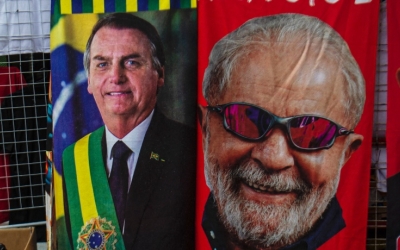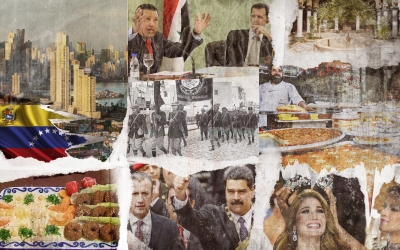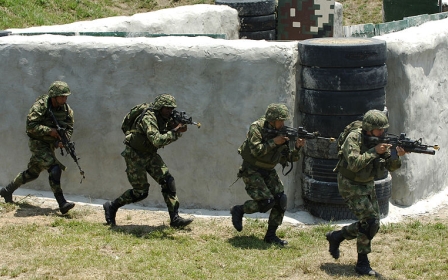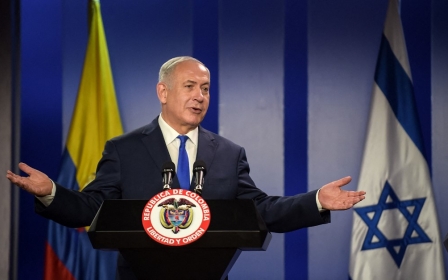What the election of Colombia's first leftist leader means for Palestine
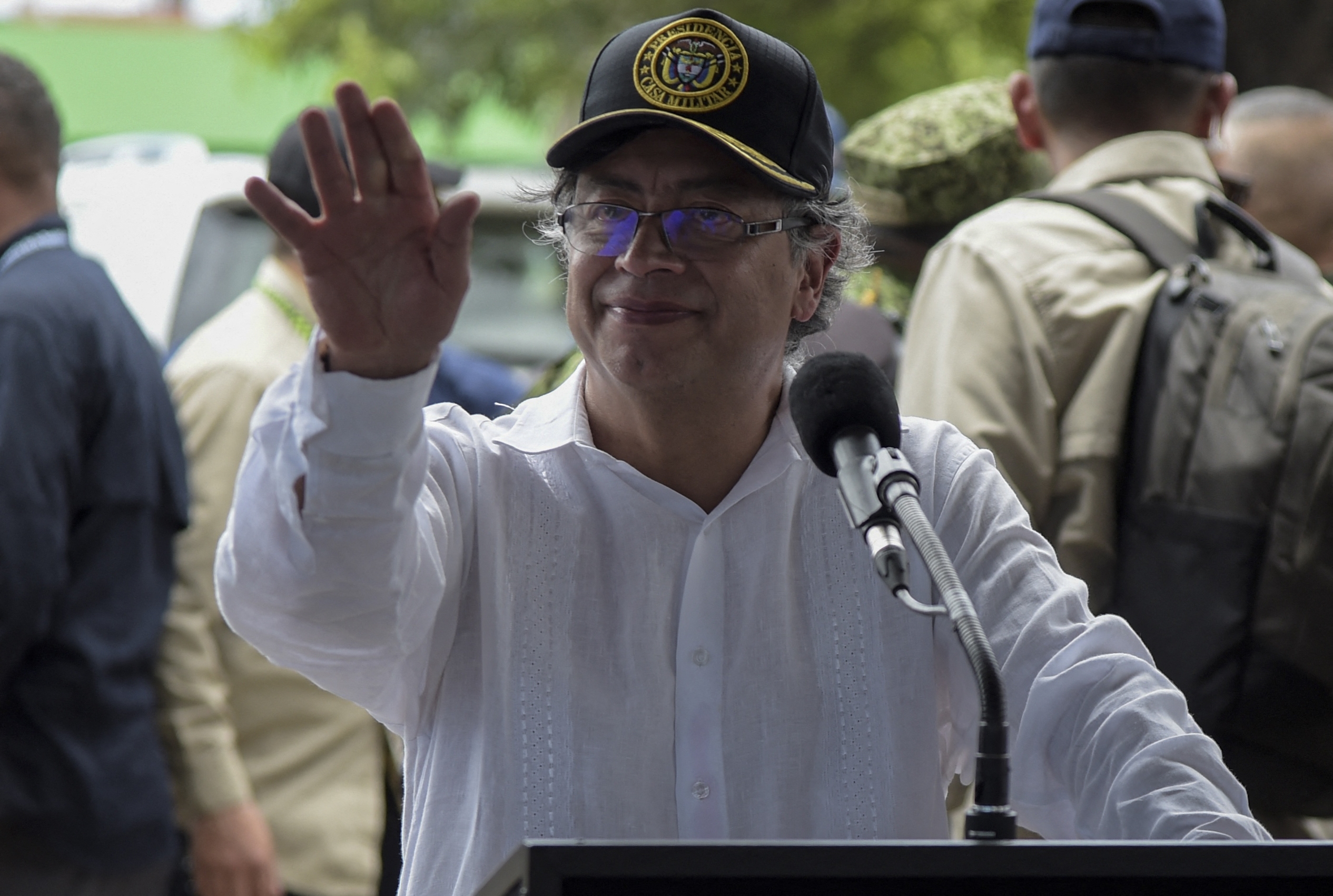
Latin America is witnessing a changing of the political guard.
In Brazil, Luiz Inacio Lula da Silva, the leftist former president, is leading in polls against right-wing incumbent populist Jair Bolsonaro, in the final round of elections scheduled for October 30. But already, several countries across the region have opted for political renewal, ushering in a wave of leftist governments in Honduras, Chile, Mexico, Peru, Bolivia, Argentina and - most recently - Colombia.
In early August, Gustavo Petro, a former guerilla fighter, was sworn in as Colombia's first ever leftist leader, an historic event in a country that experienced a decades-long civil war which only formally ended in 2016.
Petro ran an ambitious campaign built around a promise of widespread structural change, political reform, and addressing inequalities and social justice.
Colombia's new president has also been a vocal supporter of the Palestinian cause, despite this not forming a major part of his presidential agenda.
New MEE newsletter: Jerusalem Dispatch
Sign up to get the latest insights and analysis on Israel-Palestine, alongside Turkey Unpacked and other MEE newsletters
'He is the president of a friendly country, but beyond that he can be a like-minded person in whom we can trust'
- Alexander Montero, political adviser, Palestinian diplomatic mission to Colombia
Before taking office, Petro had made a number of public statements in defence of Palestine and the plight of its people, which he once described as a "struggle of a people for freedom and independence".
In May 2018, Petro denounced attacks on residents of Gaza by Israeli forces during the Great March of Return, tweeting: "I raise my voice against the murder of Palestinians. People are not to be massacred, they are to be respected as a culture, with the right to exist under the planet's skies. Jesus was Palestinian and asked that human beings love one another."
Years earlier, while serving as the mayor of the capital, Bogota, he posted a photo of the Palestinian flag on his Facebook page where he categorised the Palestinian cause as "historic".
"He's a person who's very close to the Palestinian issue," Alexander Montero, political adviser at the Palestinian diplomatic mission in Colombia, tells Middle East Eye.
"He is the president of a friendly country, but beyond that he can be a like-minded person in whom we can trust and seek to carry the Palestinian message when necessary."
Shift
Petro's election could represent a shift in the Colombian approach and relationship with Palestine, given that previous governments had close ties with Israel, according to Colombian author and analyst Victor de Currea-Lugo, whose work focuses on the Middle East.
"Petro's victory presupposes the possibility of an improved relationship with the Palestinian Authority. Bearing in mind that the previous governments have been particularly pro-Israeli," de Currea-Lugo told MEE.
He points out that Colombia only officially recognised Palestine as a sovereign state in 2018, one of the last countries in Latin America to do so.
"It would be expected that, in terms of foreign policy, with the arrival of more democratic figures to the Ministry of Foreign Affairs, this would imply greater recognition and dialogue with the representatives of the Palestinian Authority in Colombia," de Currea-Lugo added.
For the Palestinian diaspora in Colombia - which is roughly 100,000-120,000 strong - the election of Petro is a welcome change, yet one that is met with reservation and guarded expectations.
Lukewarm positions
Despite casting his vote for the new president, Colombo-Palestinian George Siman downplayed the significance Petro's presence could have for Palestine. "It doesn't mean anything really," he told MEE.
"The Petro government, despite being seen as somewhat anti-imperialist or anti-colonialist, really has not had even moderately lukewarm positions [towards Palestine]. Once in power, it's been an absolute disappointment and incoherence from the government, and I'm sure Petro himself is aware."
Regardless of Siman's scepticism, Montero hopes Petro's administration will be able to "search for peace and respect international law".
"We see Colombia as a brotherly country and Colombian society as a sister society and it may be the moment to take the steps to formalise the friendship and those fraternal links we have long had.
"We can move forward and improve our diplomatic relations without any fear. All the opposite, it would transmit a great message of peace and respect for international law," Montero says.
Ties with Israel
The new president was also publicly critical of Israel before assuming office. In 2019, Petro compared the actions of the Israeli state towards Palestinians with the treatment of Jews at the hands of the Nazis.
He tweeted: "One thing is the State of Israel and the Jewish religion is another, just as the Colombian State is one thing and the Catholic religion another. Confusing state and religion is characteristic of an archaic mindset. The State of Israel discriminates against Palestinians like Nazis did against Jews."
Nonetheless, Petro's public support of Palestine - as well as his comments about Israel - have yet to put much of a strain on Bogota's relationship with Israel.
'It doesn’t mean anything really'
- Colombo-Palestinian George Siman
Following his successful presidential bid, the Israeli foreign ministry congratulated Petro, tweeting: "We congratulate the people of Colombia and President-elect Gustavo Petro on a successful democratic election and look forward to further strengthening the relations between Israel and Colombia and between our two peoples."
While still a presidential candidate, Petro also met with a group of Israeli and Jewish businessmen.
This amicability between the new Petro government and Israel was reflected early on in the new government's tenure. In mid-September, the president of the Colombian Senate, Roy Barreras, met with the Israeli ambassador to Colombia to discuss an "agenda of bilateral cooperation".
"Along with the Ambassador of Israel we propose an agenda of cooperation in favour of the agroindustry. Colombia has the land, [Israel] the technology and experience in rural associations. The Free Trade Agreement that [former president Ivan] Duque signed makes sense if we become a world agro-industrial power and dignify the peasantry," Barreras tweeted, along with a video of the encounter.
The meeting ruffled feathers among some members of Colombia's Palestinian community, who felt sidelined by the Petro government.
"[Our cause] is not a priority," Siman said.
Currea-Lugo says business and military intelligence links remain strong between Colombia and Israel.
"Therefore, I don't think there is adequate sensitivity to what the Palestinian cause means and there is a fairly pragmatic handling of relations with Israel," de Currea-Lugo said.
Representatives of Colombia's Ministry of Foreign Affairs did not respond to requests for comment for this article.
'Israel's biggest ally'
The proximity between Colombia and Israel is by no means a novel development, as Petro's predecessor - the right-wing Ivan Duque - held a close relationship with Tel Aviv during his tenure.
While in office, Duque strengthened ties and signed a free trade agreement with Tel Aviv, describing Israel as a "sister nation" in an interview in 2021.
Speaking to Red+ Noticias, Duque said Colombia was "Israel's biggest ally in Latin America," adding Colombia wanted "to strengthen that alliance".
It remains to be seen exactly how Petro's relationship with Israel will develop during his presidency. Siman expects a minor shift in tone in contrast with Duque's warm friendship, yet nothing that would drastically change relations.
"Diplomatically - in the best of cases - there will be a little cooling off, because the diplomatic figures in Colombia have spoken in favour of Palestine and its reality in the past. Yet over the next four years, Zionism will survive," he said.
Regardless of the Petro administration's initial proximity to Israel, Siman stills hopes the new president will work to defend their cause while in office
"I ask he continues to take as his own the most just cause of our times, the Palestinian cause. I ask for consistency between that and his international and local attitude towards the Palestinian people. May you never abandon it, because if he abandons Palestine, he is, in part, abandoning the Colombian people themselves," Siman says.
This article is available in French on Middle East Eye French edition.
Middle East Eye delivers independent and unrivalled coverage and analysis of the Middle East, North Africa and beyond. To learn more about republishing this content and the associated fees, please fill out this form. More about MEE can be found here.


